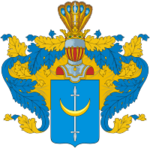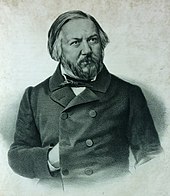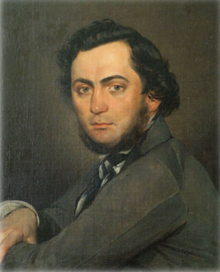Mikhail Glinka

Mikhail Ivanovich Glinka(Russian:Михаил Иванович Глинка[a],romanized:Mikhail Ivanovich Glinka[b],IPA:[mʲɪxɐˈil‿ɨˈvanəvʲɪdʑ‿ˈɡlʲinkə];1 June [O.S.20 May] 1804 – 15 February [O.S.3 February] 1857) was the first Russian composer to gain wide recognition within his own country and is often regarded as the fountainhead of Russianclassical music.[2]His compositions were an important influence on other Russian composers, notably the members ofThe Five,who produced a distinctive Russian style of music.
Early life and education[edit]

Glinka was born in the village of Novospasskoye, not far from theDesna Riverin theSmolensk Governorateof theRussian Empire(now in theYelninsky Districtof theSmolensk Oblast). His wealthy father had retired as an army captain, and the family had a strong tradition of loyalty and service to thetsars,and several members of his extended family had lively cultural interests. His great-great-grandfather was aPolish–Lithuanian Commonwealthnobleman, Wiktoryn Władysław Glinka of theTrzaskacoat of arms who was given lands in theSmolensk Voivodeship.In 1655, Wiktoryn converted to Eastern Orthodoxy with the new name Yakov Yakovlevich (Jacob, son of Jacob), and remained the owner of his lands under the tsar. The coat of arms was originally received after his conversion fromLithuanian paganismto Catholicism according to theUnion of Horodło.[3][4]
Mikhail was raised by his overprotective and pampering paternal grandmother, who fed him sweets, wrapped him in furs, and confined him to her room, which was kept at 25 °C (77 °F). Accordingly, he became something of a hypochondriac and later in life retained the services of numerous physicians, and often falling victim toquacks.The only music he heard in his youthful confinement was the sounds of the village church bells and the folk songs of passing peasant choirs. The church bells were tuned to a dissonant chord, and so his ears became used to strident harmony. While his nurse would sometimes sing folksongs, the peasant choirs who sang using thepodgolosochnayatechnique (an improvised style—literally "under the voice" —using improvised dissonant harmonies below the melody) influenced his independence from the smooth progressions ofWestern harmony.
After his grandmother's death, he moved to his maternal uncle's estate some 10 kilometres (6 mi) away, where he heard his uncle's orchestra, whose repertoire includedHaydn,MozartandBeethoven.At the age of about ten he heard them play a clarinet quartet by theFinnishcomposerBernhard Henrik Crusell,which had a profound effect upon him. "Music is my soul", he wrote many years later, recalling the experience. While his governess taught him Russian, German, French and geography, he also received instruction on the piano and violin.
At 13, Glinka went to the capital,Saint Petersburg,to attend a school for children of the nobility. He learned Latin, English, and Persian, studied mathematics and zoology, and considerably widened his musical experience. He had three piano lessons fromJohn Field,the Irish composer ofnocturnes,who spent some time in Saint Petersburg. He then continued his piano lessons withCharles Mayerand began composing.[3]

When he left school his father wanted him to join the Foreign Office, and he was appointed assistant secretary of the Department of Public Highways. The light work allowed Glinka to settle into the life of a musicaldilettante,frequenting the city'sdrawing roomsand social gatherings. He was already composing a large amount of music, such as melancholy romances which amused the rich amateurs. His songs are among the most interesting parts of his work from this period.
In 1830, at a physician's recommendation, Glinka traveled to Italy with tenorNikolai Kuzmich Ivanov.They took a leisurely pace, ambling through Germany and Switzerland, before settling in Milan. There, Glinka took lessons at theconservatorywithFrancesco Basili.He struggled withcounterpoint,which he found irksome. After three years listening to singers, romancing women with his music, and meeting famous people includingMendelssohnandBerlioz,he became disenchanted with Italy. He realized that his life's mission was to return to Russia, write in a Russian manner, and do for Russian music whatDonizettiandBellinihad done for Italian music.
His return took him through the Alps, and he stopped for a while in Vienna, where he heard the music ofFranz Liszt.He stayed another five months inBerlin,where he studied composition under the distinguished teacherSiegfried Dehn.ACapriccio on Russian Themesfor piano duet and an unfinishedSymphony on Two Russian Themeswere important products of this period.
When word reached Glinka of his father's death in 1834, he left Berlin and returned to Novospasskoye.
Career[edit]

While in Berlin, Glinka became enamored of a beautiful and talented singer, for whom he composedSix Studies for Contralto.He contrived a plan to return to her, but when his sister's German maid turned up without the necessary paperwork to cross to the border with him, he abandoned his plan as well as his love and turned north for Saint Petersburg. There he reunited with his mother, and made the acquaintance of Maria Petrovna Ivanova. After a brief courtship, they married, but the marriage was short-lived, as Maria was tactless and uninterested in his music. His initial fondness for her was said to have inspired the trio in the first act of his operaA Life for the Tsar(1836), but his naturally sweet disposition coarsened under his wife's and mother-in-law's constant criticism. When the marriage ended, she remarried, and Glinka moved in with his mother, and later with his sister, Lyudmila Shestakova.[3]
A Life for the Tsarwas the first of Glinka's two great operas. It was originally entitledIvan Susanin.Set in 1612, it tells the story of the Russian peasant and patriotic heroIvan Susaninwho sacrifices his life for theTsarby leading astray a group of maraudingPoleswho were hunting him.Tsar Nicholas Ihimself followed the work's progress with interest and suggested the change in the title. It was a great success at its premiere on 9 December 1836, under the direction ofCatterino Cavos,who had written an opera on the same subject in Italy. The Tsar rewarded Glinka for his work with a ring valued at 4,000rubles.(During the Soviet era, the opera was staged under its original title,Ivan Susanin.)
In 1837, Glinka was installed as the instructor of theImperial Chapel Choir,with a yearly salary of 25,000 rubles and lodging at the court. In 1838, at the Tsar's suggestion, he traveled to Ukraine to gather new voices for the choir; the 19 new boys he found earned him another 1,500 rubles from the Tsar.
He soon embarked on his second opera,Ruslan and Lyudmila.The plot, based on the tale byAlexander Pushkin,was concocted in 15 minutes byKonstantin Bakhturin,a poet who was drunk at the time. Consequently, the opera is a dramatic muddle, yet the quality of Glinka's music is higher than inA Life for the Tsar.Theoverturefeatures a descendingwhole tone scaleassociated with the villainous dwarf Chernomor, who has abducted Lyudmila, daughter of the Prince ofKiev.There is much Italianatecoloratura,and Act 3 contains several routine ballet numbers, but Glinka's great achievement lies in his use of folk melody which becomes thoroughly infused into themusical argument.Much of the borrowed folk material isorientalin origin. When it debuted on 9 December 1842, it was received coolly, but subsequently gained popularity.
Later years[edit]

Glinka went through a dejected year after the poor reception ofRuslan and Lyudmila.His spirits rose when he travelled to Paris and Spain. In Spain he met Don Pedro Fernández, his secretary and companion for the last nine years of his life.[5]In Paris,Hector Berliozconducted some excerpts from Glinka's operas and wrote an appreciative article about him. Glinka in turn admired Berlioz's music and resolved to compose somefantasies pittoresquesfor orchestra. Beginning in 1852, he spent two years in Paris, living quietly and frequently visiting thebotanicalandzoological gardens.He then moved to Berlin where, after five months, he died suddenly on 15 February 1857, following acold.He was buried in Berlin, but a few months later his body was taken to Saint Petersburg and reinterred in the cemetery of theAlexander Nevsky Monastery.
The genesis of a Russian style[edit]
Glinka was the beginning of a new direction in Russian music.[6][7]Musical culture arrived in Russia from Europe, and for the first time specifically Russian music began to appear, in Glinka's operas. Historical events were often used as its basis, but for the first time they were presented realistically.[7][8]
The first to note this new direction wasAlexander Serov.[9]He was then joined by his friendVladimir Stasov,[9]who became the theorist of this cultural trend;[8]it was developed further by composers of "The Five".[6][7]
Modern Russian music criticViktor Korshikovwrote: "Russian musical culture [would not have developed] without...three operas—Ivan Soussanine,Ruslan and Ludmila,andThe Stone Guest.Soussanineis an opera where the main character is the people;Ruslanis the mythical, deeply Russian intrigue; and inGuest,the drama dominates over the softness of the beauty of sound. "[10]Two of these operas—Ivan SoussanineandRuslan and Ludmila—were Glinka's.
Glinka's work, and that of the composers and other creative people he inspired, has been instrumental in the development of a distinctly Russian artistic style that occupies a prominent place in world culture.
Legacy[edit]


After Glinka's death, the relative merits of his two operas became a topic of heated debate in the musical press, especially betweenVladimir Stasovand his former friendAlexander Serov.Glinka's orchestral compositionKamarinskaya(1848) was said byPyotr Ilyich Tchaikovskyto be "the acorn from which the oak" of later Russian symphonic music grew.[11]
In 1884,Mitrofan Belyayevfounded the annual Glinka Prize, whose early winners includedAlexander Borodin,Mily Balakirev,Tchaikovsky,Nikolai Rimsky-Korsakov,César CuiandAnatoly Lyadov.
Outside Russia, several of Glinka's orchestral works have been fairly popular in concerts and recordings. Besides the well-knownoverturesto the operas (especially the brilliantly energetic overture toRuslan), his major orchestral works include the symphonic poemKamarinskaya(1848), based on Russian folk songs; and two Spanish works,A Night in Madrid(1848, 1851) andJota Aragonesa(1845). He also composed manyart songsand piano pieces, and some chamber music.[12]
A lesser work that received attention in the last decade of the 20th century was Glinka's "Patrioticheskaya Pesnya",supposedly written for a contest for anational anthemin 1833. In 1990, theSupreme Soviet of Russiaadopted it as the regional anthem of theRussian Soviet Federative Socialist Republic,which till then was the only Soviet constituent state without its own anthem.[13]Following the dissolution of the Soviet Union and the Russian SFSR, the hymn was retained unofficially until it was officially confirmed as theRussian national anthemin 1993, where it remained as such until 2000 when it was replaced by the Soviet anthem with new lyrics.[14]
Three Russianconservatoriesare named after Glinka:
- Nizhny NovgorodState Conservatory (Russian:Нижегородская государственная консерватория им. М.И.Глинки)[15]
- Novosibirsk State Conservatory(Russian:Новосибирская государственная консерватория (академия) им. М.И.Глинки)[16]
- MagnitogorskState Conservatory (Russian:Магнитогорская государственная консерватория)[17]
Soviet astronomerLyudmila Chernykhnamed aminor planet2205 Glinkain his honor. It was discovered in 1973.[18]Acrateron Mercury is also named after him.
Glinkastraße inBerlinwas named in Glinka's honor. In the wake of theGeorge Floyd protests,theBerlin U-BahnstationMohrenstraßewas proposed to be renamed "Glinkastraße", which is adjacent to the station. The plan was cancelled due to Glinka's reputed antisemitism.[19]
In September 2022, following theRussian invasion of Ukraine,a street inDnipro,Ukraine, that was named after Glinka was renamed to honorQueen Elizabeth II.[20]
In popular culture[edit]

The stirring overture to Glinka's operaRuslan and Lyudmilais heard as the theme of the long-running U.S. television comedy seriesMom.Its creators felt the fast-paced, complex orchestral music reflected the characters' struggles to overcome their destructive habits and keep up with the demands of daily life.[21]
Works[edit]
Media[edit]
References[edit]
Notes
- ^In Glinka's day, his name was writtenМихаилъ Ивановичъ Глинка.
- ^The ALA-LCtransliteration of Russianis used for his name, the result is identical to BGN/PCGN here. ISO 9 system:Mihail Ivanovič Glinka.[1]Latin:Michael Ioannis filius Glinka.
- ^"Russian – ALA-LC transliteration system".transliteration.Retrieved2 December2020.
- ^"...regarded by his compatriots as the source and fountainhead of Russian Music", in "Russian Symphony Orchestra",New York Times,1904-11-13, p. 10.
- ^abc"Михаил Иванович Глинка — русский композитор".Школьное дополнительное образование: классическая музыка. Archived fromthe originalon 11 August 2011.Retrieved18 October2009.
- ^"Glinka family COA".gerbovnik.ru(in Russian).General Armorial of the Noble Families of the Russian Empire.Retrieved7 January2021.
- ^Grove Music Online "Glinka"
- ^abMikhail Glinka
- ^abcCreativity M.I. Glinka // ru: Творчество М.И. Глинки (лекция)
- ^abCulture: The Works of Glinka // ru: Творчество Глинки
- ^ab"Александр Серов (Alexander Serov)"(in Russian). Классическая музыка.Retrieved17 March2013.
- ^Victor Korshikov.Do you want, I'll teach you to love the opera. And not only about the music. Publishing house Ya T. Moscow, 2007 // ru:Виктор Коршиков.Хотите, я научу вас любить оперу. О музыке и не только. Издательство ЯТЬ. Москва, 2007
- ^"Mikhail Glinka — Repertory Archive".abt.org.American Ballet Theatre.Retrieved2 December2020.
- ^Ю. Н. Фост — Память о М. И. Глинке в Берлине
- ^Decree of the Supreme Soviet of the RSFSR of 23.11.1990 on the national anthem of the RSFSR[On the National Anthem of the Russian SFSR].Supreme Soviet of the Russian SFSR(in Russian). lawrussia.ru. 23 November 1990. Archived fromthe originalon 27 January 2016.Retrieved25 January2015.
- ^"Presidential Decree"[Presidential Decree on the National Anthem of the Russian Federation].President of the Russian Federation(in Russian). lawrussia.ru. 11 December 1993. Archived fromthe originalon 22 March 2015.Retrieved25 January2015.
- ^"Нижегородская государственная консерватория им. М.И.Глинки (НГК им. М.И.Глинки)"(in Russian). uic.nnov.ru. Archived fromthe originalon 11 January 2008.Retrieved15 July2007.
- ^"conservatoire.ru".Archived fromthe originalon 27 September 2007.Retrieved5 September2007.
- ^magkmusic
- ^Schmadel, Lutz D. (2003).Dictionary of Minor Planet Names(5th ed.). New York: Springer Verlag. p. 179.ISBN3-540-00238-3.
- ^"Mohrenstrasse: Berlin farce over renaming of 'racist' station".BBC News.9 July 2020.
- ^"In the center of Dnipro, the street of Stepan Bandera appeared - the mayor".Ukrayinska Pravda(in Ukrainian). 21 September 2022.Retrieved18 October2022.
- ^"Through a Farce Darkly: How a Glinka Overture Became the Theme Song for the Sitcom" Mom "".WMFT, Chicago.27 October 2017.
Sources
- Brown, David(1974).Mikhail Glinka, a biographical and critical study,Oxford University Press.
- Glinka Mikhail Ivanovich, biographic encyclopedia, in Russianon biografija.ru
- Knowles, John Paine (Ed.), Theodore Thomas, and Karl Klauser (1891).Famous Composers and Their Works,J.B. Millet Company.
- Taruskin, Richard, "Glinka, Mikhail" inTheNew Grove Dictionary of Opera,(Ed.) Stanley Sadie (London, 1992)ISBN0-333-73432-7
External links[edit]
 Works by or aboutMikhail Ivanovich GlinkaatWikisource
Works by or aboutMikhail Ivanovich GlinkaatWikisource- List of works(in German)
- Cylinder recording of a Glinka composition,from theCylinder Preservation and Digitization Projectat theUniversity of California, Santa BarbaraLibrary.
- Glinka – the author of Russian national anthem(in Russian)by K.Kovalev
- Leicestershire Schools Symphony Orchestra performsRusslan and LudmillaovertureonYouTubeA short video from 1998
- The chorus "Glory" from the opera "A Life for the Tsar"onYouTube
- Free scores by Mikhail Glinkaat theInternational Music Score Library Project(IMSLP)
- Free scores by Mikhail Glinkain theChoral Public Domain Library(ChoralWiki)
- Turgenev and Glinka(with music samples)
- Mikhail Glinka
- 1804 births
- 1857 deaths
- People from Smolensk Oblast
- People from Yelninsky Uyezd
- People from the Russian Empire of Polish descent
- Composers from the Russian Empire
- Russian male opera composers
- National anthem writers
- Russian opera composers
- Russian Romantic composers
- 19th-century classical composers
- 19th-century male musicians
- 19th-century male musicians from the Russian Empire
- Pupils of Siegfried Dehn
- Burials at Tikhvin Cemetery
- Glinka family

